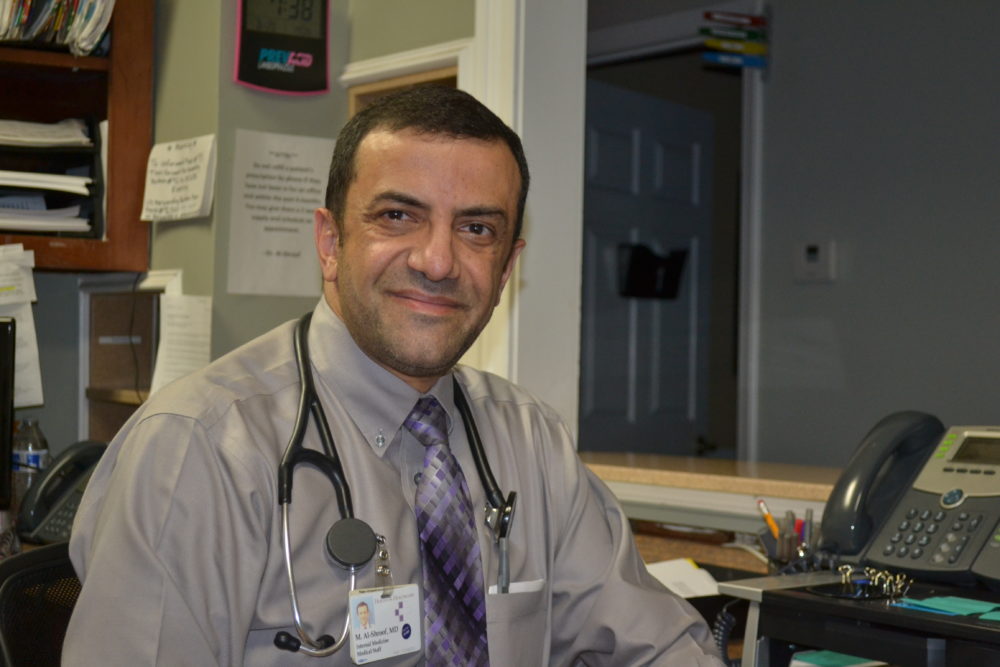This is the fourth in a series of articles on foreign-born physicians practicing in Georgia. Other articles in this special report have focused on barriers that immigrant doctors face if they want to work in the state; a clinic that serves mainly immigrant and refugee patients; and on Indian physicians here.
If you get admitted to the Houston Medical Center in the central Georgia town of Warner Robins, there is a good chance that a physician from the Middle East or South Asia will treat you. And there’s a good chance, too, that the physician is a Muslim.
A few years ago, it was a guarantee for certain patients, says Dr. Mohammad Al-Shroof.
“It just happened that all interventional cardiologists — heart specialists who put in stents and do bypass surgery — on staff were Muslims,” recalls the Warner Robins internist, who is also the chief of staff at Houston Medical Center. And most of them were foreign born.

“So, if you had a heart attack and were taken to our hospital, the doctor saving your life was a Muslim, regardless.”
There are about 220 physicians in Houston County, which is solid GOP territory. Al-Shroof estimates that more than a quarter of them have an immigrant background.
Al-Shroof, 49, was born in Jordan with Palestinian roots. He came to the United States 27 years ago, did his residency training at Nassau University Medical Center in Long Island, N.Y., and then moved to Middle Georgia, because that’s where they needed doctors, especially in primary care. Then he decided to stay. It’s been 20 years now.
There are close to 1 million active physicians in the United States. About 25 percent of them are trained in a foreign medical schools, finds a 2018 report by the American Immigration Council. About 5 percent of doctors practicing in the U.S. are Muslims, the majority of them foreign born and trained, according to the Institute for Social Policy and Understanding (ISPU).
Nearly half of Muslim physicians in the U.S. felt more scrutiny at work compared to their peers, and many said they experienced discrimination at the workplace, according to a study by Aasim Padela at the University of Chicago.
The majority of foreign-born and foreign-trained physicians cluster in the Northeast and in certain places in the Midwest, as well as in California and Florida, according to a 2017 study by Thomas Ricketts, a health policy professor at the University of North Carolina at Chapel Hill. “With a few exceptions the South lags a little behind in terms of integrating international medical graduates into the physician workforce,” says Ricketts.
But he adds that Georgia “is above the fold.” According to the AMA Physician Masterfile, 17 percent of practicing physicians in Georgia are foreign born, only one percent less than the national average.
‘A good community to live in’
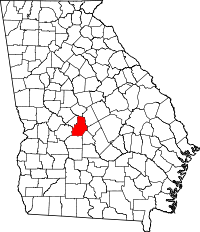
Most foreign physicians train in their home countries. To be licensed in the U.S. they have to complete a full residency here, typically on J-1 student visa. Afterward, if they want to stay, U.S. immigration law requires them to practice in a medically underserved area on a special visa waiver status, called the Conrad 30 program, for at least three years before they can apply for a green card and eventually, U.S. citizenship.
Mohammad Al-Shroof has two passports, one Jordanian and one American.
As did Al-Shroof, many foreign doctors choose to stay in smaller cities and rural communities. He lives in Warner Robins with his wife, Nadia, who is a dentist but never practiced in Georgia, and their four sons.
“Georgia is a red state, and Houston County is a red county,” he says. “But at the end of the day we decided that this is a good community to live in.”
He admits that one reason he stayed was convenience. Another, opportunity.
“We have good schools here,” he says. “The crime rate is low. The rule of law prevails. Traffic is light.” He adds that he doesn’t have much competition. “As a doctor you can really prosper here.”
But foreign physicians, like many immigrants in the U.S. and especially those coming from Muslim countries, face increased scrutiny after the Trump administration tightened the visa and immigration policy.
Take Dr. Almatmed Abdelsalam, 35, who works as a hospitalist at Navicent Health Medical Center in Macon and lives in Warner Robins. Everything seemed to go according to plan for the young Libyan internist. He did his residency at the University of Central Florida in Orlando. At the end of 2016, he started his application process for a Conrad 30 visa, and tried to find a hospital to do his three-year assignment in an underserved area.
Libya is on the list of predominantly Muslim countries that were hit by President Trump’s series of travel bans.
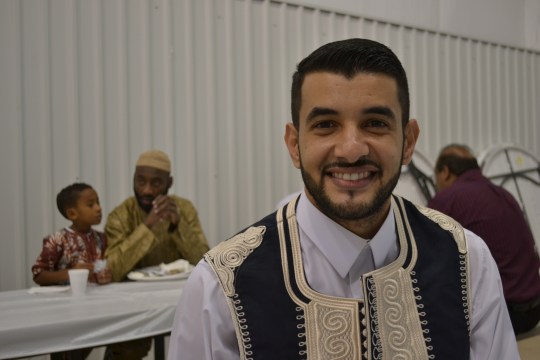
Abdelsalam eventually got a physician job in Macon. But the application process took longer than usual and involved many rounds of submitting and resubmitting paperwork. During that time, he, his wife and their two young, U.S. born kids often felt like they were stuck in a quagmire of paperwork.
“We reached a point of complete discomfort and sense of helplessness, really,” he says. Still today the family has to renew their visas every few months.
Abdelsalam admits that when he first learned about his placement in Middle Georgia, he was a bit anxious. “The political atmosphere is so tense. People feel like they are allowed to say things in the open right now that were only whispered before.”
But then he was positively surprised. “It’s a great community here,” he says. “There are a lot of people of different faiths, backgrounds and cultures.”
Once his three-year obligation is over Abdelsalam says he and his family would most likely apply for a permanent resident status and stay in Middle Georgia. “We’re part of the society now,” he firmly says.
Dr. Buthena Nagi feels the same. Also from Libya, and employed as a hospitalist at Navicent Health, Nagi, 40, completed her three-year commitment in Macon this last spring. She’s been in the country for 10 years.
Like Abdelsalam, she and her family would like to stay in the Warner Robins area, given they get a green card. “Most people are very welcoming here,” she says. “And we have a very vibrant and active Muslim community.”
Being visible is Al-Shroof’s mantra.
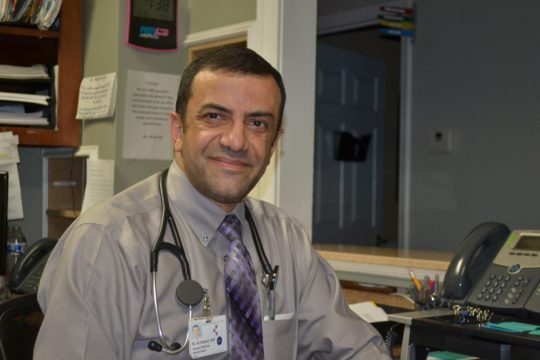
“For the communities to embrace us, they have to see us,” he says. “And they cannot see us if we’re just sitting in our homes and our mosques and closing the doors on ourselves.”
That’s why, from the very beginning, he decided to get involved in community events, local committees, interfaith organizations and medical associations. At the Islamic Center, of which he was one of the founding members, he frequently invites members of the non-Islamic community.
It’s an effort that has paid off, says Angie Gheesling, executive director of the Development Authority of Houston County.
An international presence
“All of the foreign companies we have introduced to the community have taken note of the international presence in Houston County,” she says, adding that in her experience, foreign doctors often offer “better access to health care for employees.”
Gheesling also points out that “site consultants specifically inquire about health care,” and about the number and the variety of specialists. Houston Healthcare, which runs the local hospital in Warner Robins, is the third-largest employer in the county. Having a pool of internationally trained physicians plays a key role “in our ongoing economic development success,” Gheesling says.
A big presence in Warner Robins is Robins Air Force Base, which employs about 25,500 military and civilian personnel. Most people working at the base have been exposed to different countries and cultures while on duty, says Gheesling.

“There is not only an acceptance in receiving people from foreign countries; they are genuinely welcome.”
All of this may be a first line of defense against bias, stereotypes, faith-based discrimination or even hostility. But it is not a complete protection, as Al-Shroof and most of his colleagues have experienced in one way or another.
Al-Shroof remembers one incident with a patient that he still finds puzzling. It was during the 2016 presidential campaign. “So this man who’s been my patient for a long time tells my nurse that he doesn’t like Muslims and never wants to be treated by a Muslim,” he says.
The nurse thought the man was kidding. When she told him his doctor was a Muslim, “he was baffled and a little embarrassed,” he says. “But he still comes to my practice to this day. And we’ve never spoken about this incident.”
Buthena Nagi wears a hijab with her scrubs or white doctor coat, and sometimes patients and colleagues ask her about it.
“I then explain that this is part of my religion,” she says. “And once the dialogue kicks in the fear dies down, and people seem to understand that I’m not an alien from outer space but a human with the same hardships of life like all of them”
The University of Chicago study found that almost 10 percent of the physicians reported patients had refused their care because they are Muslim.
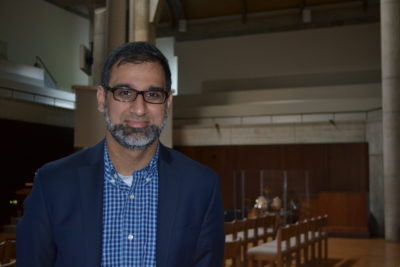
The Islamic Medical Association of North America (IMANA), which is the largest Muslim physician organization, confirms this trend. Nabile Safdar, vice-president at IMANA and a radiologist at Emory University in Atlanta, says he’s heard from physicians in emergency departments “where patients perceive the physicians as being Muslim, because they are wearing a hijab, or based on their name, and they say, ‘I don’t want to be treated by you.’ ”
While Amatmed Abdelsalam’s future in the U.S. is still up in the air, he tries to only focus on the immediate step ahead.
“Take care of your patients, follow up, move on to the next day,” he says. “Because people will still get sick. And people will still need care.”
Katja Ridderbusch is an Atlanta-based independent journalist who reports for newspapers, magazines and public radio stations in the United States and Germany.
Read other stories in our series:
Part One: Doctors born in India fill medical gaps in Georgia
Part Two: Trained to be a doctor, but held back by red tape
Part Three: Giving back: Immigrant doctors helping immigrant patients

